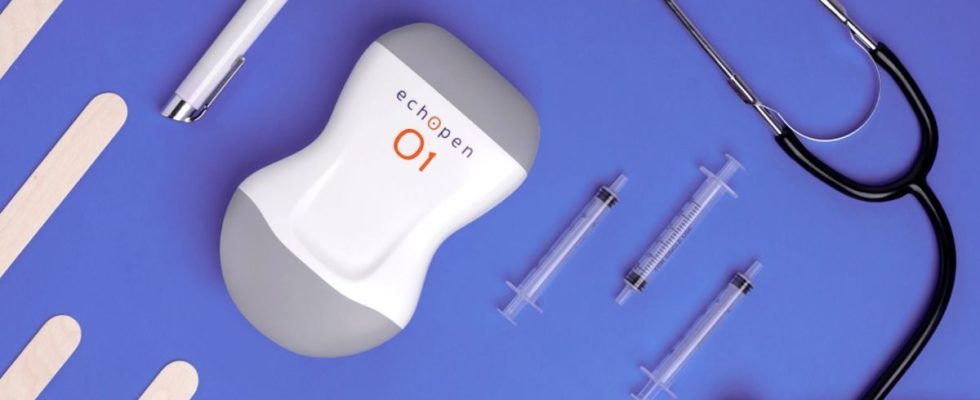Published on
Updated
Reading 2 min.
An “ultra-portable” ultrasound probe for smartphones, intended in particular for general practitioners and emergency doctors to help with diagnosis, the first of its type manufactured in France, will be marketed in the spring, the Assistance publique-Hôpitaux de Paris announced on Wednesday ( AP-HP) and the start-up it hosts, echOpen.
This ultrasound medical imaging probe “fits in the pocket” and “connects wirelessly via a dedicated application” to most Android or iOS smartphones, Olivier de Fresnoye, co-founder and general manager of echOpen, a start-up born at AP-HP and based at the Hôtel Dieu hospital in Paris.
“The smartphone allows you to display the image, store it temporarily or send it to a +cloud+ service and share it with colleagues in a secure manner“, he continues.
“The objective is not to replace the extremely technical ultrasound machine of the radiologist, which allows a fine diagnosis to be made.“, but to offer primary care caregivers — general practitioners, liberal specialists or emergency physicians — a “new clinical examination tool”, specifies the manager.
A general practitioner may, for example, after having “auscultated, palpated, questioned” his patient, “add an echo shot, like passing a stethoscope, to see through the skin, look at various organs such as the liver, kidney, heart (…) and guide your diagnosis“, he explains.
Several uses are envisaged: for directing patients to emergency rooms, for care provided by paramedics, for tele-expertise, etc., with the aim of “to speed up care” And “avoid wandering“medical.
Several manufacturers, particularly American and Chinese, have developed probes of this type, generally intended for expert doctors and sold “a few thousand or even tens of thousands of euros“, specifies Olivier de Fresnoye. But that ofechOpen is a first in France as in Europe for “such an affordable price, less than 1,000 euros“.
The project “was born from the intuition of a young doctor, Mehdi Benchoufi” (the other co-founder of echOpen), says Nicolas Castoldi, deputy director at AP-HP.
“A community of engineers“was formed around the Hôtel Dieu for”meet this technological challenge: produce a light, robust, high-performance probe, at a sufficiently controlled price” to be “widely accessible“, he relates. When the association became a start-up in 2021, AP-HP entered the capital, “a first”.
Developed thanks to a “permanent relationship” with caregivers, the probe will be deployed from the first trimester in various “pilot services”, before “serial production by April”. The AP-HP hopes “that it will be widely distributed, in France and abroad and particularly in Africa“.
